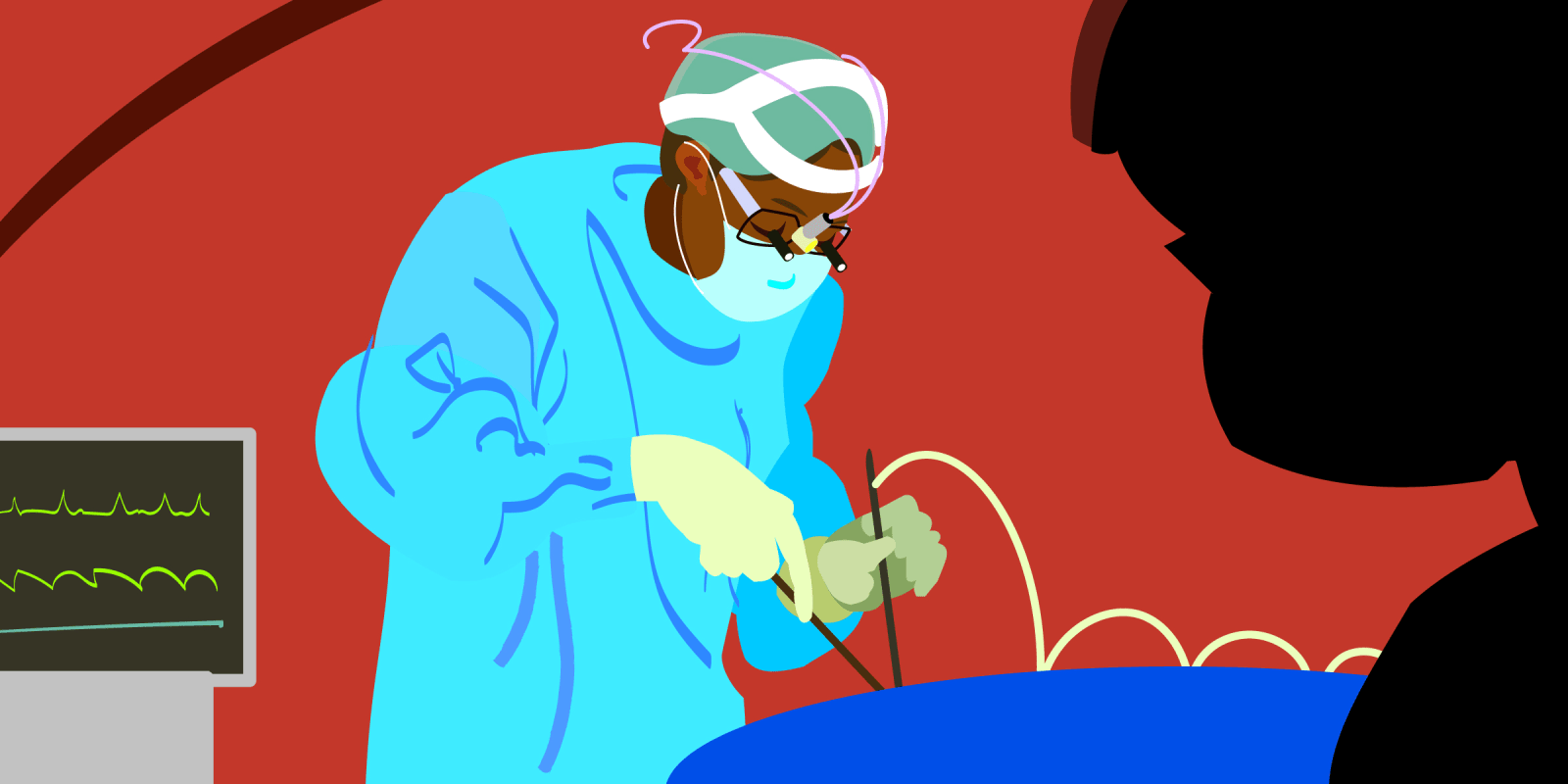As I mark my patient in the pre-op area one morning, her husband says, “Doc, I have a question. It’s a long day. Do you eat or use the bathroom?” It’s a good question. Traditionally, my routine has been to mark the patient; use the bathroom in the locker room and change into my scrubs; take my last sip of coffee as the patient is wheeled into the OR; and forget about both of those bodily functions until many hours later — usually when I leave for home at 5 p.m. I never considered the physical toll my job took on my body.
Recently, however, things have changed. Not long ago, I was in the home stretch of a breast reconstruction surgery, closing a patient’s abdominal incision and in-setting the breasts. I had started that day with a five-mile run in preparation for the task ahead — the run helps to ground me — but today was different. During the surgery, the dehydration (I’m a heavy sweater) and need for fine motor movements started to take a toll, presenting itself in the form of muscle spasms that made it difficult to grasp my forceps. Eventually, my thumb locked — and I had to pause to massage it and release the spasm.
That experience made me wonder: In what other ways has my choice to be a surgeon affected my body? During my morning swims, I sometimes feel my medial epicondylitis flare up — what’s often referred to as “tennis elbow.” I don’t play tennis, but I do perform liposuction procedures almost daily. During pilates, my instructor has pointed out the discrepancy between my right and left arms — my left shoulder and elbow have better mobility; my right is stuck, unable to extend completely. Other colleagues have described experiencing a similar impingement on their shoulders. Together, we have hypothesized that the impingement occurs from holding the lighted breast retractor for prolonged periods of time.
I have been a surgeon since I was 25 years old; I don’t know how my body would feel any other way. And I am not alone: Plastic surgeons are notorious for contorting themselves into awkward positions to have the smallest or most aesthetically pleasing incision possible. As a resident, I observed my attendings discontinue their microvascular careers or require neck surgery because of the physical toll of their jobs — years spent hunched over the OR table or the microscope.
A few weeks ago, I came home to search online for a heated and contoured neck pillow to rest my neck. I had mentioned my stiff neck after a free flap, and my RN First Assistant recommended this pillow; it has since become a necessity after a long day in the OR. I also recall questions from in-service exams referencing the ubiquity of “gamekeeper’s thumb” in plastic surgeons who performed closed capsulotomies for capsular contracture — another example of the physical effects of the job.
As for microsurgeons like myself, long and complex procedures are a badge of honor. This approach — focusing on the task at hand at the expense of one’s physical well-being — has carried over into my personal life. On road trips, my husband likes to stop frequently to use the restroom or get coffee or soda, while I prefer to stop only when the gas tank is empty — a product of my training.
Many of us fail to consider surgery as a highly physical as well as mental career. We think of surgeons as performing life-saving surgeries, yes, but rarely do we consider the effects on the surgeons themselves. For whatever reason, the general public doesn’t think of surgery as being prone to the same types of overuse injuries as other careers involving one’s hands and bodies. And yet, rather than being a purely intellectual job, surgery requires both the mind and the body to be successful — our minds plan the operation, and our bodies are required to execute the operation. And so, what happens as our bodies start to manifest the physical toll? What happens if this begins to occur before our brains are exhausted? How can we keep our bodies safe?
During the past few years — as I have increasingly experienced neck spasms or numbness in my fingers at the end of the operating day — I have begun to be more cognizant of the toll my job takes on my body. I have realized that performing eight-hour flaps may not be what I want to do anymore, and I have begun, as well, to drink more water during the day, and to pay attention to how I position myself when operating. I’ve also been reading articles about surgical ergonomics and the importance of taking stretch breaks in the OR. These days, my weekends are peppered with regular sessions of yoga, pilates, and a massage when I am able. I have also begun to transition my practice away from complex eight-hour microsurgical reconstruction procedures to shorter and more aesthetic procedures.
I know now, having been in the field long enough to prove myself, that surgeons are no more immune to injuries than are their patients. Today, I advise all surgeons to listen to their bodies. It’s by ensuring your own health that you become a better surgeon, not by collecting badges of honor that are really markers of a willingness to self-harm. My fellow surgeons, I urge you: Pay attention to the surgical ergonomics. Pay attention to the height of your OR table, the position of your neck, the way that your loops fit. Take time to rest your muscles. Take time to hydrate. As physicians and surgeons, we must learn to practice what we preach to our patients.
To answer the question posed by my patient’s husband, I responded, “After completing the microvascular anastomosis, I will take a short break to use the bathroom, drink some water, and eat very quickly. But the entire team is working hard and caring for your wife during that time as well.” It’s not an answer I would have given in the past. But it’s the answer that is true today.
How do you care for your health as a surgeon? Share your strategies in the comments below!
Dr. Anureet Bajaj is a plastic surgeon in private practice in Oklahoma City, Oklahoma. She enjoys running, painting, and spending time with her dogs and family. Her IG handle is @bajajplasticsurgery. Dr. Bajaj is a 2022–2023 Doximity Op-Med Fellow.
Illustration by Jennifer Bogartz






